Manufacturing Supply Chain Management in Singapore [2025 Guide]
Singapore is a global hub for manufacturing and logistics, powering industries from electronics to aerospace. At the core of this success is manufacturing supply chain management—the system that links suppliers, manufacturers, warehouses, and distributors to deliver products efficiently and cost-effectively.
In today’s competitive market, supply chain management in Singapore goes beyond moving goods. It’s about resilience, digital transformation, and staying agile amid global disruptions. For manufacturers, strong supply chain practices mean lower costs, faster production cycles, and higher customer satisfaction.
This guide explores the importance of supply chain management in Singapore’s manufacturing industry, real-world examples, and how new technologies like AI, IoT, and ERP systems are reshaping the landscape. We’ll also highlight how offshore IT partners help companies build smarter, more sustainable supply chains ready for the future.
Table of Contents
- What Is Manufacturing Supply Chain Management?
- Singapore’s Manufacturing Supply Chain Landscape
- Importance of Supply Chain Management in Singapore’s Manufacturing Industry
- How Manufacturing Supply Chain Management Works
- Key Components of Manufacturing Supply Chain Management
- Technology’s Role in Modern Manufacturing Supply Chains
- Case Studies of Supply Chain Management in Manufacturing
- Challenges and Risks of Manufacturing Supply Chain Management
- Best Practices for Optimizing Manufacturing Supply Chain Management
- How Offshore Development Vendors Support Manufacturing Supply Chains
- Kaopiz – Your Trusted Partner in Manufacturing Supply Chain Management
- Future Trends in Manufacturing and Supply Chain Management
- Conclusion
- FAQs
What Is Manufacturing Supply Chain Management?
Manufacturing supply chain management refers to the planning, coordination, and control of all activities involved in transforming raw materials into finished goods and delivering them to customers. It is the backbone of the manufacturing software industry, ensuring that every stage—from procurement and production to warehousing and distribution—runs smoothly and cost-effectively.
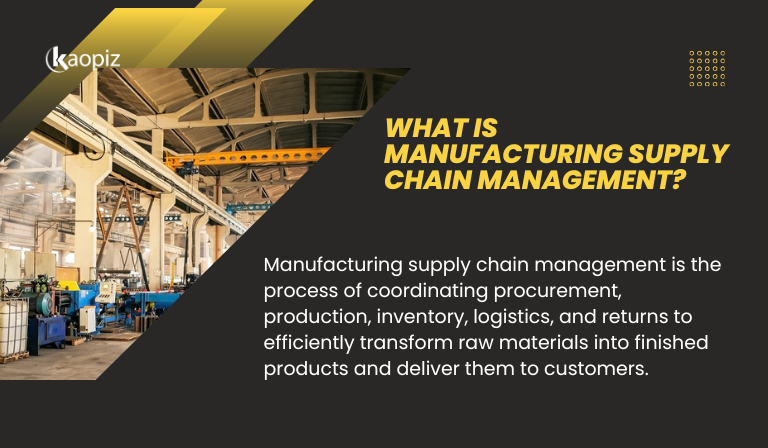
In simple terms, it is the system that connects suppliers, manufacturers, logistics providers, and retailers into one integrated process. Unlike general supply chain management, which can apply to any industry, manufacturing in supply chain management focuses specifically on optimizing production processes, reducing waste, and meeting customer demand with precision.
Singapore’s Manufacturing Supply Chain Landscape
Singapore has built a reputation as a leading global hub for manufacturing and supply chain management, thanks to its strategic location, advanced infrastructure, and pro-business policies. The manufacturing sector contributes around 20% to the nation’s GDP, with strong clusters in:
- Electronics – semiconductor production and high-tech components.
- Precision engineering – advanced machinery, robotics, and tools.
- Chemicals – petrochemicals, specialty chemicals, and materials.
- Biomedical sciences – pharmaceuticals, medtech, and healthcare products.
- Aerospace – aircraft maintenance, repair, and parts manufacturing.
Key strengths of Singapore’s supply chain ecosystem include:
- Presence of world-class supply chain companies (MNCs and local players).
- Strong logistics infrastructure with air, sea, and land connectivity.
- Advanced digital supply chain solutions supporting real-time visibility.
- Pro-business policies that attract global manufacturers.
The Singapore government’s “Manufacturing 2030” vision further strengthens this ecosystem by:
- Driving Industry 4.0 adoption (AI, IoT, cloud, and automation).
- Building resilient and sustainable supply chains.
- Positioning Singapore as a global innovation and talent hub for advanced manufacturing.
For businesses, this means operating in an environment where efficiency, connectivity, and innovation converge, making Singapore an ideal base for regional and global supply chain operations.
Importance of Supply Chain Management in Singapore’s Manufacturing Industry
In Singapore, where manufacturing is a key economic pillar, efficient supply chain management is not just a support function—it is a strategic advantage. As global supply chains become more complex and competitive, companies that invest in robust supply chain management gain the ability to lower costs, boost efficiency, and stay resilient in the face of disruptions.
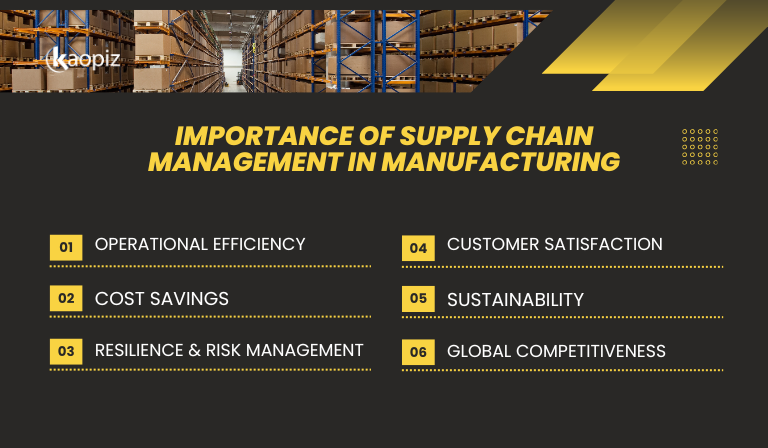
The importance of supply chain management in manufacturing industry:
- Operational Efficiency – Streamlined processes ensure raw materials, production schedules, and logistics work seamlessly, reducing bottlenecks.
- Cost Savings – Smarter procurement, lean inventory practices, and optimized logistics help manufacturers cut unnecessary expenses.
- Resilience & Risk Management – Strong SCM allows businesses to respond quickly to global shocks such as pandemics, geopolitical conflicts, or shipping delays.
- Customer Satisfaction – Faster delivery, consistent quality, and reliable service strengthen brand reputation in highly competitive markets.
- Sustainability – With Singapore pushing for green manufacturing, efficient supply chains help reduce waste, emissions, and energy usage.
- Global Competitiveness – By maintaining world-class supply chains, Singapore manufacturers remain attractive partners in regional and international trade.
How Manufacturing Supply Chain Management Works
At its core, manufacturing supply chain management is about connecting every stage of the production journey into one seamless system—from sourcing raw materials to delivering finished goods. Unlike general supply chain management, which can apply to any sector, manufacturing supply chains must coordinate complex processes inside and outside the factory floor.
The flow of a manufacturing supply chain:
- Procurement of Raw Materials – Businesses source raw materials and components from local or global suppliers, balancing cost, quality, and reliability.
- Production & Manufacturing – Materials are transformed into finished products through processes like machining, assembly, or packaging. This is where lean manufacturing supply chain management helps reduce waste and increase efficiency.
- Inventory & Warehousing – Products are stored, tracked, and managed to meet demand without overstocking or delays.
- Distribution & Logistics – Goods are transported to wholesalers, retailers, or directly to customers through Singapore’s world-class logistics infrastructure.
- After-Sales & Reverse Logistics – Returns, repairs, and recycling complete the loop, supporting sustainability goals.
In practice, the manufacturing process in supply chain management is highly dynamic. It requires close collaboration between suppliers, manufacturers, logistics providers, and technology systems to ensure speed, quality, and resilience.
Key Components of Manufacturing Supply Chain Management
Effective manufacturing supply chain management depends on the smooth integration of several key components. Each stage plays a vital role in ensuring that raw materials are transformed into finished products and delivered to customers with efficiency, quality, and reliability.
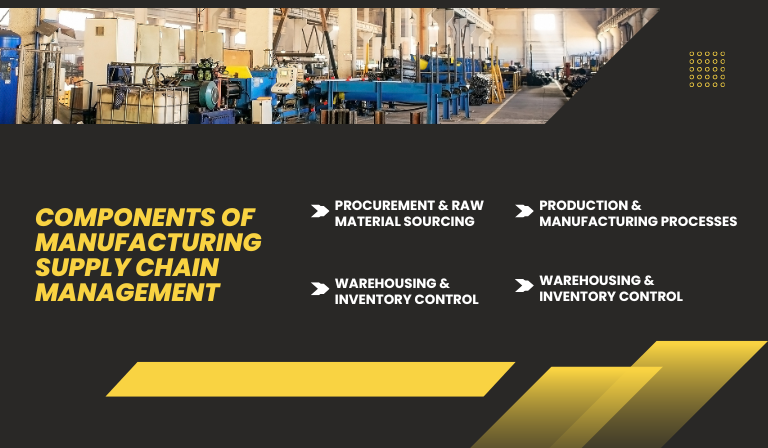
Procurement & Raw Material Sourcing
Procurement is the first step in building a resilient supply chain. Manufacturers must secure high-quality raw materials at competitive costs while minimizing risks.
- Strategic supplier selection and long-term partnerships help guarantee quality and reliability.
- Supplier management platforms and AI-driven analytics provide insights into supplier performance, compliance, and risk.
- Traceability tools such as blockchain verify material origins—an increasingly important factor for industries that demand transparency and sustainability.
Production & Manufacturing Processes
The production phase transforms raw materials into finished goods, making it the core of supply chain management.
- Manufacturing Execution Systems (MES) track production workflows, optimize scheduling, and monitor equipment efficiency.
- Lean manufacturing supply chain management practices minimize waste and streamline operations.
- Automation, robotics, and digital twins simulate processes, identify bottlenecks, and improve throughput while maintaining quality standards.
Warehousing & Inventory Control
Inventory and warehousing act as the bridge between production and customer demand. Efficient control prevents costly overstocking or shortages.
- Warehouse Management Systems automate storage, picking, and order fulfillment.
- Techniques like just-in-time (JIT) and safety stock planning balance efficiency with risk management.
- Real-time visibility through IoT sensors enables accurate demand forecasting and smarter inventory decisions.
Distribution & Logistics
Distribution ensures finished products reach customers on time and in good condition. In Singapore, this is supported by world-class logistics infrastructure.
- Transportation Management Systems (TMS) optimize routes, cut fuel costs, and provide real-time shipment tracking.
- Integration with e-commerce platforms and last-mile delivery solutions improves customer experience.
- Leveraging Singapore’s strong port and airport facilities enhances global supply chain connectivity, making it an ideal hub for regional distribution.
Technology’s Role in Modern Manufacturing Supply Chains
In today’s competitive landscape, technology is no longer optional—it is the driving force behind resilient, efficient, and customer-centric manufacturing supply chain management. From real-time visibility to predictive analytics, digital tools help manufacturers in Singapore streamline operations, cut costs, and build more agile supply chains.
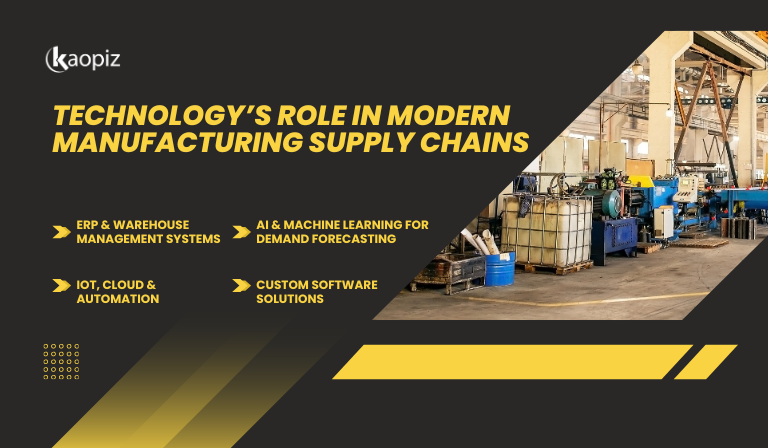
ERP & Warehouse Management Systems (WMS)
- ERP systems like SAP and Oracle integrate procurement, production, inventory, and logistics into a single platform.
- WMS solutions automate storage, order picking, and fulfillment, reducing human error and improving speed.
- Together, they provide end-to-end visibility and optimize decision-making across the supply chain.
AI & Machine Learning for Demand Forecasting
- AI-driven forecasting models analyze sales history, market trends, and external factors (e.g., economic shifts, seasonality).
- Machine learning continuously improves accuracy, helping manufacturers avoid overstocking or shortages.
- AI in logistics optimizes routes, reducing delivery times and transportation costs.
IoT, Cloud & Automation
- IoT sensors track real-time conditions—such as temperature, machine performance, or inventory levels—across factories and warehouses.
- Cloud platforms centralize data, enabling global teams to collaborate seamlessly and respond quickly to disruptions.
- Automation technologies, including robotics and digital twins, improve production efficiency and simulate scenarios to detect bottlenecks before they occur.
Custom Software Solutions
- Off-the-shelf systems often fall short for complex manufacturing operations.
- Partnering with a software development company in Singapore or an IT outsourcing vendor allows businesses to build tailored solutions like custom ERP modules, advanced analytics dashboards, or IoT-integrated platforms.
- These solutions enhance scalability and provide a competitive edge.
Case Studies of Supply Chain Management in Manufacturing
Leading companies around the world have applied different strategies to optimize their manufacturing supply chain management. By examining the real-world supply chain management examples, we can see how Toyota, Zara, and Procter & Gamble (P&G) have each built a competitive advantage through unique supply chain approaches.
Toyota
Toyota’s supply chain is built on the Toyota Production System (TPS), which emphasizes lean practices to reduce waste and improve efficiency.
- Core Practices: JIT production, jidoka (automation with human oversight), and continuous improvement (kaizen).
- Technical Enablers: Kanban signals for material flow, heijunka (leveled scheduling), and andon systems for real-time visibility.
- Impact: Lower inventory costs, faster line adjustments, and earlier detection of quality issues. Toyota’s model demonstrates how lean manufacturing supply chain management drives long-term efficiency and quality.
Zara (Inditex)
Zara has built one of the most agile supply chains in the retail sector, enabling it to respond quickly to fashion trends.
- Core Practices: Nearshore production for fast-turnaround items, postponement at the fabric stage, and vertically integrated design-to-store processes.
- Distribution Model: Centralized hub known as The Cube manages automated distribution and supports frequent in-season product launches.
- Impact: End-to-end cycle times of around 15 days, reduced unsold inventory, and the ability to refresh collections up to 20 times per season. Zara exemplifies how supply chain management in manufacturing industry creates responsiveness at scale.
Procter & Gamble
Procter & Gamble leverages advanced technology to integrate and optimize its global supply chain.
- Core Practices: Real-time monitoring through its “Business Sphere” control tower and a shift from siloed functions to holistic optimization.
- Technologies: AI-driven forecasting, IoT-enabled logistics, and cloud-based ERP platforms.
- Impact: Gains include 1–2% sales growth, 2–5% margin improvements, and 5–10% higher asset utilization. P&G shows how technology-driven manufacturing supply chain management enhances both service quality and cost efficiency.
Challenges and Risks of Manufacturing Supply Chain Management
While supply chain management for manufacturing industry is essential for efficiency and competitiveness, it comes with a range of challenges and risks. For companies in Singapore—operating in a fast-paced global economy—these issues can directly impact costs, delivery times, and customer satisfaction.
- Supply Chain Disruptions – Events like pandemics, geopolitical conflicts, or port delays can halt raw material flow and logistics. Singapore’s trade-heavy economy is especially vulnerable to these shocks.
- Rising Costs – Higher labor, energy, and transport costs increase operational expenses. Without lean strategies or automation, manufacturers struggle to maintain margins.
- Demand Volatility – Fluctuating customer demand makes accurate forecasting difficult. This often results in either costly overstocking or damaging stockouts.
- Supplier Dependence & Quality Risks – Over-reliance on a few suppliers raises risks of disruption. Weak supplier performance can also compromise product quality and timelines.
- Technological Gaps – Many manufacturers still rely on disconnected systems. Lack of ERP, MES, and WMS integration reduces visibility and slows decision-making.
- Regulatory & Compliance Pressure – Meeting ISO standards, ESG rules, and data security requirements is increasingly complex. Non-compliance risks financial penalties and brand damage.
- Sustainability Concerns – Pressure to reduce emissions and adopt greener practices is growing. Transitioning to sustainable supply chains requires significant investment and restructuring.
Best Practices for Optimizing Manufacturing Supply Chain Management
To stay competitive in today’s fast-changing market, manufacturers must go beyond efficiency and adopt strategies that build resilience, agility, and sustainability. The following best practices highlight how companies can optimize their manufacturing supply chain management for long-term success.
- Embrace Digital Transformation – Adopt ERP, MES, and WMS platforms to unify processes. Real-time data visibility improves forecasting, scheduling, and decision-making across the supply chain.
- Leverage AI & Predictive Analytics – Use machine learning to forecast demand, predict maintenance needs, and optimize logistics routes. This reduces costs while boosting agility.
- Adopt Lean Manufacturing Principles – Apply JIT and waste-reduction strategies to streamline operations and enhance efficiency without compromising quality.
- Strengthen Supplier Relationships – Build long-term partnerships with multiple suppliers. Regular performance evaluations ensure reliability, compliance, and reduced dependency on single vendors.
- Integrate IoT & Automation – IoT sensors, robotics, and digital twins provide real-time monitoring, automate repetitive tasks, and detect bottlenecks before they disrupt production.
- Enhance Sustainability Practices – Implement green initiatives such as energy-efficient operations, recyclable packaging, and optimized transport to meet ESG goals and customer expectations.
- Build Supply Chain Resilience – Diversify sourcing, create contingency plans, and establish regional hubs to withstand global disruptions while keeping operations stable.
- Invest in Talent & Training – Equip teams with digital and analytical skills. Skilled professionals can maximize the value of new technologies and continuous improvement initiatives.
How Offshore Development Vendors Support Manufacturing Supply Chains
As supply chains become more complex and technology-driven, many manufacturers face challenges in building and maintaining the digital systems needed to stay competitive. Partnering with an offshore development vendor or IT outsourcing company in Singapore provides access to specialized expertise, cost savings, and scalable solutions that strengthen every stage of the manufacturing supply chain.
- Custom Software Solutions – Offshore teams develop tailored ERP, WMS, and SCM platforms that address unique production and logistics needs, unlike generic off-the-shelf tools.
- AI, IoT & Data Analytics – Vendors integrate smart technologies such as AI forecasting, IoT-enabled monitoring, and predictive analytics to improve demand planning, reduce downtime, and optimize logistics.
- Cost Efficiency & Flexibility – Outsourcing IT development lowers overhead costs, provides access to skilled engineers, and enables manufacturers to scale systems without long recruitment cycles.
- System Integration & Cloud Migration – Offshore IT partners modernize legacy infrastructure, migrate operations to the cloud, and unify data for end-to-end supply chain visibility.
- Ongoing Maintenance & Support – Beyond implementation, offshore vendors provide continuous system updates, cybersecurity enhancements, and 24/7 technical support to ensure resilience.
For manufacturers in Singapore, collaborating with an offshore IT firm allows them to focus on core operations while leveraging advanced technologies to build smarter, faster, and more sustainable supply chains.
Kaopiz – Your Trusted Partner in Manufacturing Supply Chain Management
At Kaopiz, we understand that modern manufacturing supply chains require more than efficiency—they demand agility, resilience, and innovation. With over 10 years of experience, 1,000+ successful projects, and a team of 600+ skilled engineers, Kaopiz has become a trusted IT outsourcing company and offshore development vendor for global manufacturers.
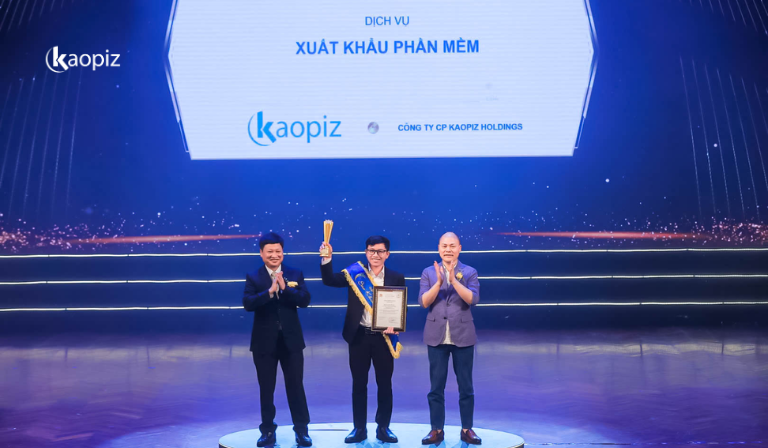
Why Choose Kaopiz:
- Deep Industry Expertise – We have delivered ERP, WMS, IoT, and AI-powered solutions tailored to the manufacturing and supply chain industry.
- Custom-Built Solutions – Instead of one-size-fits-all software, Kaopiz develops systems designed around each client’s processes and goals.
- Scalable Offshore Teams – Our dedicated development teams in Vietnam provide cost-effective, flexible support while maintaining international standards of quality.
- Cloud & AI Capabilities – From cloud migration to predictive analytics and smart factory solutions, we help manufacturers stay ahead of the Manufacturing 2030 Singapore vision.
- End-to-End Support – Beyond development, we provide integration, testing, and 24/7 maintenance to ensure supply chain systems remain secure and reliable.
By combining technical expertise with industry knowledge, Kaopiz helps manufacturers in Singapore and beyond optimize operations, reduce risks, and build supply chains that are smarter and more sustainable.
Future Trends in Manufacturing and Supply Chain Management
The future of manufacturing supply chain management is being shaped by digital innovation, sustainability, and global shifts in trade. For Singapore manufacturers, staying ahead means adopting strategies that blend technology with resilience. Key trends include:
- Smart Factories & Industry 4.0 – Increased use of IoT, robotics, and automation to create self-optimizing production environments that reduce downtime and improve efficiency.
- AI & Predictive Analytics – Greater reliance on machine learning for demand forecasting, predictive maintenance, and intelligent logistics planning.
- Sustainability & Green Supply Chains – Stronger focus on carbon reduction, recyclable packaging, and energy-efficient processes to meet ESG regulations and customer expectations.
- Resilient & Regionalized Supply Chains – Companies diversifying suppliers and building regional hubs to reduce risks from global disruptions.
- Cloud-Based & Connected Systems – End-to-end visibility through cloud ERP, WMS, and control towers that unify data across functions and geographies.
- Human–Machine Collaboration – Adoption of digital twins, cobots (collaborative robots), and augmented reality tools to enhance workforce productivity and safety.
- Generative AI & Automation Agents – Emerging AI tools that can optimize scheduling, automate procurement, and improve decision-making in real time.
Conclusion
Manufacturing supply chain management is no longer just about moving products from point A to point B—it is the foundation of efficiency, resilience, and competitiveness in today’s global economy. For Singapore, a nation positioning itself as a hub for advanced manufacturing under the Manufacturing 2030 vision, strong supply chain practices are essential to sustaining growth and innovation.
By embracing digital tools like ERP, AI, IoT, and cloud platforms, and by partnering with experienced offshore development vendors in Singapore such as Kaopiz, manufacturers can build smarter, more sustainable supply chains. The companies that succeed will be those that combine efficiency, agility, and technology to deliver value in a rapidly changing market.
FAQs
- What Is the Role of Manufacturing in Supply Chain Management?
- Manufacturing is the core link in the supply chain that transforms raw materials into finished goods. It connects procurement, production, and logistics, ensuring that products are delivered efficiently to meet customer demand.
- How Can Software Solutions Improve Supply Chain Management?
- Software solutions such as ERP, WMS, and AI-driven analytics provide real-time visibility, automate processes, and optimize forecasting. These tools reduce costs, improve efficiency, and enable manufacturers to make faster, data-driven decisions.
- Should Singapore Companies Work with Offshore Vendors for SCM Technology?
- Yes. Partnering with offshore development vendors allows Singapore manufacturers to access specialized IT expertise, reduce costs, and scale faster. Offshore partners can build custom SCM platforms, integrate AI and IoT, and provide continuous support—helping companies stay competitive under Singapore’s Manufacturing 2030 vision.
Trending Post

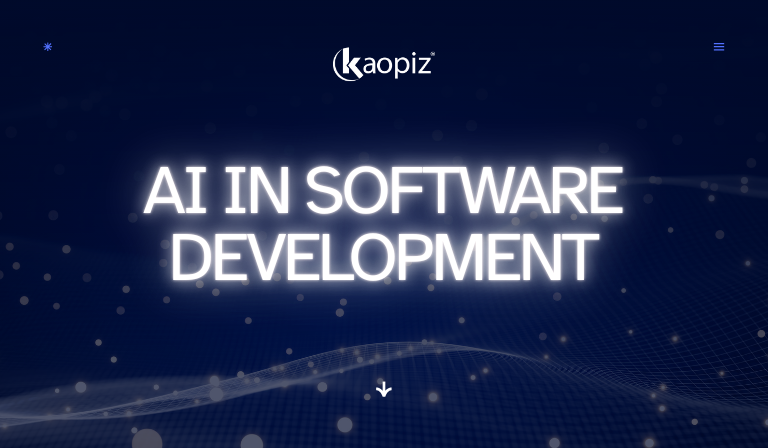



















No Comments yet!